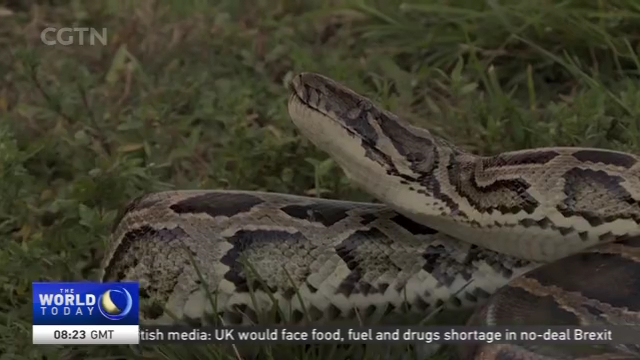
17:21, 18-Aug-2019
Reptile Invasion: Florida hunts Burmese python and iguanas to protect ecosystem
Updated
17:49, 18-Aug-2019

The US state of Florida is suffering a reptile invasion. Florida's Everglades are famous for alligators, but there is now a more worrisome predator in town, the Burmese python. And, it is threatening to annihilate the wildlife of the state's diverse ecosystem. Iguanas are also a menace to the state's infrastructure and even human health. CGTN's Nitza Soledad Perez has more.
We had to wait for nightfall. Hunting pythons in the Florida Everglades takes time, patience and preparation.
At 8 pm Donna Kalil, assistant hunter Kevin, and this crew drove into one of the largest wetlands in the world. Their quest: to catch Burmese pythons, an invasive species that's destroying the Everglade's ecosystem.
"From here on is one of the best hunting areas."
Donna is a female pioneer in the male-dominated world of snake hunting and serves the South Florida Python Elimination Program, a government mission to get rid of these natural predators. In two years, she has captured over two hundred pythons. She is one of 26 hunters hired by the local agency.
DONNA KALIL, PYTHON ELIMINATION SPECIALIST SOUTH FLORIDA WATER MANAGEMENT DISTRICT "As they get bigger, they eat larger animals, they are eating the raccoons, the opossums, and rabbits, we don't have hardly any down there. They've eaten about 98 percent in Everglades National Park, They've eaten all the animals out of there."
The hardest part of the job is finding these sneaky reptiles. They are well-camouflaged to blend in with the environment. During the summer, they hide during the day. It's too hot for them.
Kevin: "Stop!"
Donna: "This is what we are coming here for."
Tens of thousands of Burmese pythons are estimated to live in the Everglades, jeopardizing the survival of native species like the Florida Green Watersnake and the venomous coral snake. Human negligence and natural disasters combined to create today's problem.
MICHAEL KIRKLAND, INVASIVE ANIMAL BIOLOGIST SOUTH FLORIDA WATER MANAGEMENT DISTRICT "We believe they were introduced to the environment through both intentional and accidental releases. Now they are illegal to own, but in the past, people would buy them through the pet trade business here. But they quickly became too big and impractical to own, so they thought they were doing the animal a favor, and release them into the wild. Also, you have big events like Hurricane Andrew in 1992, that has the potential of damaging breeding facilities, and result in wide-scale releases."
Other invasive reptiles are also disrupting Florida's ecosystem. While looking for pythons, Donna and Kevin removed several Cuban knight anoles from the national park.
And iguanas are wreaking havoc in residential neighborhoods. Their numbers have exploded to such a level that Florida wildlife officials are encouraging people to kill them wherever possible.
MICHAEL KIRKLAND, INVASIVE ANIMAL BIOLOGIST SOUTH FLORIDA WATER MANAGEMENT DISTRICT "These animals are able to burr into our levees, potentially compromise the integrity of our levee systems. They also contribute to increased erosion in our canal banks, they are also able to spread salmonella through their feces and they are becoming more and more of a priority species to manage here in Florida."
Climate change is a contributing factor. Florida has not seen a severe cold snap since 2010. Without temperatures low enough to kill them off, the iguana population simply grows. As for the pythons, warmer temperatures could eventually enable these enormous snakes to migrate farther north.
After six hours of hunting, and only a baby python in the bag, a satisfying last-minute catch.
"We did it."
DONNA KALIL, PYTHON ELIMINATION SPECIALIST SOUTH FLORIDA WATER MANAGEMENT DISTRICT "In the areas we go hunting, I'm starting to see a couple of rabbits coming back and when I do, I'm jumping out for joy. You know, we are making a difference.”
The captured pythons will be humanely destroyed. Humans working to restore the balance, we're responsible for disrupting. Nitza Soledad Perez, CGTN, The Everglades, Florida.
SITEMAP
Copyright © 2018 CGTN. Beijing ICP prepared NO.16065310-3
Copyright © 2018 CGTN. Beijing ICP prepared NO.16065310-3